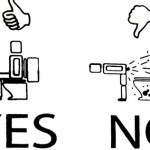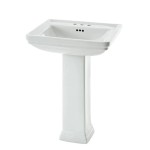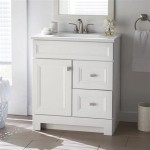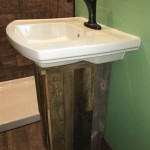What Causes a Smell in the Bathroom?
The bathroom, a space designed for hygiene and cleanliness, can sometimes be the source of unpleasant odors. These smells can range from mild and transient to strong and persistent, creating an uncomfortable environment. Understanding the causes behind these smells is essential for identifying the source and taking appropriate action to eliminate them. While many factors can contribute to bathroom odors, several common culprits are often at play.
Poor Ventilation
One of the primary reasons for bathroom odor is inadequate ventilation. Bathrooms are naturally prone to moisture build-up from showers, baths, and even simple handwashing. When this moisture is trapped within the space, it creates a breeding ground for bacteria and mold, which can release foul-smelling gases. The lack of proper ventilation prevents the escape of moisture and stale air, exacerbating the issue.
A well-ventilated bathroom allows the circulation of fresh air, carrying away moisture and odors. This can be achieved through various means, including:
- Exhaust fan: An exhaust fan is crucial for removing moisture and odors. Ensure the fan is properly installed, functioning effectively, and run it during and after showers and baths.
- Open windows: When possible, open windows to allow fresh air to circulate. This helps to reduce moisture and improve overall air quality.
- Proper door seal: A well-sealed bathroom door prevents air from escaping and helps maintain a more controlled environment.
Investing in a high-quality exhaust fan with a timer or humidity sensor can significantly improve bathroom ventilation. Regular maintenance of the fan, including cleaning and replacing filters, is vital for optimal performance.
Waste and Plumbing Issues
Waste and plumbing problems can be major contributors to unpleasant bathroom smells. These issues can include:
- Blockages in drains: Clogged drains can trap water and create a breeding ground for bacteria and mold, leading to foul odors. This can occur in the sink, shower, or bathtub drain.
- Leaking pipes: Leaks in pipes can cause moisture to build up, creating an environment conducive to bacteria and mold growth. Additionally, leaking pipes can release gases that contribute to the smell.
- Toilet issues: A faulty toilet seal or overflow valve can cause water to leak and create a lingering odor.
Addressing waste and plumbing issues requires professional attention. A plumber can diagnose and repair any leaks, clogs, or other problems that might be contributing to the smell. Regular maintenance, such as cleaning drains and checking for leaks, can prevent these issues from developing in the first place.
Organic Matter and Cleaning Practices
The presence of organic matter in the bathroom can also contribute to unpleasant odors. This includes:
- Hair and skin cells: Hair and skin cells accumulate in the shower, bathtub, and floor, providing food for bacteria and mold.
- Toilet bowl debris: Unclean toilet bowls can harbor bacteria and release unpleasant odors.
- Mold and mildew: Moisture and lack of ventilation can create an environment conducive to mold and mildew growth, which can release strong odors.
Regular cleaning is essential to prevent the accumulation of organic matter. Thoroughly cleaning the bathroom, including the shower, toilet, tub, and floor, using an appropriate cleaning agent, can help eliminate bacteria and mold growth. The use of a disinfectant cleaner for toilets and drains can also help to keep these areas free of odor-causing bacteria.
In addition to regular cleaning, consider implementing these practices:
- Wipe down surfaces after use: Quickly wiping down surfaces after showers and baths can help prevent moisture build-up and reduce the growth of bacteria and mold.
- Use a toilet bowl cleaner regularly: A regular toilet bowl cleaner helps control bacteria and prevents the build-up of debris that can cause odors.
- Address mold and mildew issues promptly: If mold or mildew growth is detected, take immediate action to remove and prevent its recurrence. Proper ventilation and moisture control are critical in preventing these issues.
Other Factors
Other factors can also influence bathroom odors, including:
- Personal hygiene products: Perfumes, deodorants, and other personal hygiene products can release strong odors, which may linger in the bathroom.
- Air fresheners: While air fresheners might temporarily mask odors, they can also contribute to air pollution and mask underlying problems.
- Pets: Pet accidents or pet waste can be a source of odor, especially if not cleaned up promptly.
Identifying and addressing these factors can help manage bathroom odors effectively.

7 Causes Of A Sewer Smell In The Bathroom Hays
What To Do When You Notice A Sewer Smell In Bathroom Spaces Howstuffworks

What Causes A Sewer Smell In The Bathroom Make It Right

Why Does My Toilet Smell Like Sewage 5 Causes Solutions

Smelly Bathroom 4 Tips From Our Bentleigh Plumbers Watermaster Plumbing

What Causes Bathroom Drains To Smell

My Bathroom Smells Like A Sewer What Causes That And How Do You Fix It Kitchen Infinity

Sewer Smell In Bathroom Identify And Eliminate The Odor

How To Get Rid Of Sewage Smell In Your Bathroom Bond Cleaning Adelaide

Why Does My Toilet Stink Out Of This World
Related Posts







